

Post-Scarcity Does Not Mean Post-Work. By Daniel Altman Does the rise of the robots doom us all to unemployment?
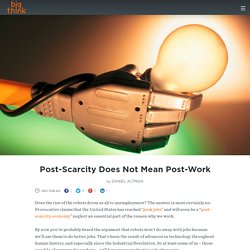
The answer is most certainly no. Provocative claims that the United States has reached “peak jobs” and will soon be a “post-scarcity economy” neglect an essential part of the reason why we work. By now you’ve probably heard the argument that robots won’t do away with jobs because we’ll use them to do better jobs. That’s been the result of advances in technology throughout human history, and especially since the Industrial Revolution. But if robots are exceptionally good at their jobs, and we can use them to make just about everything, then another argument suggests that we won’t actually need to work. The problem with these predictions is that providing for basic needs is not the only thing that compels us to work.
It’s surprising that this simple observation has eluded the post-scarcity futurists. For instance, Google encourages its employees to spend one day a week on their own projects. A World Without Work. IMAGINE, as 19th-century utopians often did, a society rich enough that fewer and fewer people need to work — a society where leisure becomes universally accessible, where part-time jobs replace the regimented workweek, and where living standards keep rising even though more people have left the work force altogether.
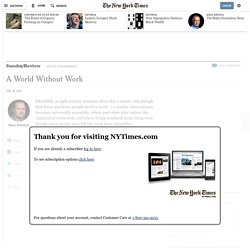
If such a utopia were possible, one might expect that it would be achieved first among the upper classes, and then gradually spread down the social ladder. First the wealthy would work shorter hours, then the middle class, and finally even high school dropouts would be able to sleep late and take four-day weekends and choose their own adventures — “to hunt in the morning,” as Karl Marx once prophesied, “fish in the afternoon, rear cattle in the evening, criticize after dinner ...” Yet the decline of work isn’t actually some wild Marxist scenario.
Photo Of course, nobody is hailing this trend as the sign of civilizational progress. But human flourishing is another matter. Robots are surrounding us, but humanity shouldn't be afraid... yet. Public fears about robots taking our jobs and rising up against humanity are understandable but unfounded, not least because we are already surrounded by them.
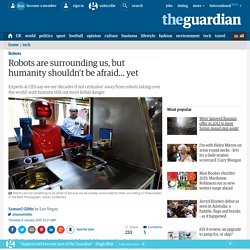
That’s according to three experts in robotics, drones and autonomous cars speaking at CES in Las Vegas, responding to fears expressed about robotics and artificial intelligence [AI] by Tesla and SpaceX boss Elon Musk, as well as familiar killer-robot tropes from science fiction. The reality is much more mundane. “We’re already surrounded by robots – our dishwashers, washing machines and driers,” said Chris Anderson, chief executive of US drones firm 3D Robotics.
“I like to think that robots are only things that don’t work right, because a vacuum is a vacuum not robot.” BMW’s head of driver assistance and perception Dr Werner Huber explained that many of the cars currently on our roads are also robots, of a sort. “Any technology can be abused by humans – so robotics isn’t special in this respect. Rise of the robots: what will the future of work look like? What impact will automation – the so-called "rise of the robots" – have on wages and employment over the coming decades?
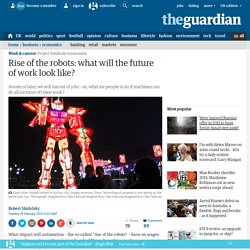
Nowadays, this question crops up whenever unemployment rises. In the early nineteenth century, David Ricardo considered the possibility that machines would replace labour; Karl Marx followed him. Third of Britons fear rise of robots, says poll. More than one in three Britons fear the rise of the machines will threaten the human race, a survey has claimed.
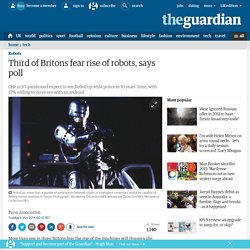
Almost as many worry they could lose their job to robots, and 10% expect to see RoboCop-style police in 10 years' time. The poll of attitudes to technology and robots was conducted among 2,000 members of the British public to mark the launch of a new sci-fi TV police drama, Almost Human, which features an android police officer. More than a quarter of participants believed that robots or intelligent computers would be capable of feeling human emotion in the future. Forty-six per cent thought technology was evolving too quickly and undermining traditional ways of life, while 35% were concerned about the use of unmanned military drones. Will robots take our jobs? Experts can't decide. Experts are divided over the role of robots over the next decade, with some arguing that they will create more jobs than they displace, and others worrying that they could lead to income inequality and a breakdown in social order.
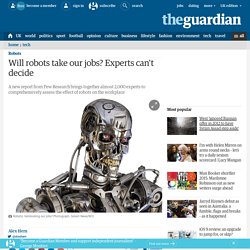
The findings come from a report by Pew Research, which surveyed almost two thousand individuals with expertise in artificial intelligence (AI), robotics and economics, to find out their predictions for the role of automation between today and 2025. The experts were almost perfectly split, with 52% predicting an optimistic path, and 48% worrying about the future. The optimists envisioned “a future in which robots and digital agents do not displace more jobs than they create,” according to Aaron Smith, the report’s co-author. Will robots create more jobs than they destroy? Martin Ford is the founder of a Silicon Valley software firm and the author of The Rise of the Robots: Technology and the Threat of Mass Unemployment.
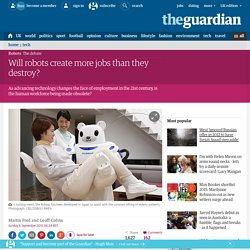
Geoff Colvin is senior editor at large at Fortune magazine and author of Humans Are Underrated: What High Achievers Know That Brilliant Machines Never Will. Martin Ford To understand why today’s information technology could have a much more dramatic impact on employment than anything we’ve seen before, it’s best to begin by considering the nature of work performed by most of our population. The reality is that a very large fraction of our workforce is engaged in activities that are on some level routine, repetitive and predictable. This is not to say that most people have jobs that are rote-repetitive, but rather that most workers face the same types of challenge again and again and that most of their actions and decisions can be predicted, based on what they have done in the past.
Management column: why it is time we rethink the nature of work. These are anxious times in the world of work, and not just for individuals fretting over where future jobs will come from.
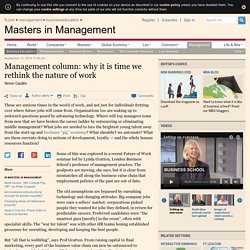
Organisations too are waking up to awkward questions posed by advancing technology. Where will top managers come from now that we have broken the career ladder by outsourcing or eliminating middle management? The AI Revolution: Our Immortality or Extinction. Note: This is Part 2 of a two-part series on AI.
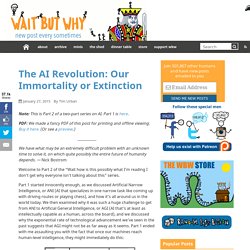
Part 1 is here. PDF: We made a fancy PDF of this post for printing and offline viewing. Buy it here. (Or see a preview.) We have what may be an extremely difficult problem with an unknown time to solve it, on which quite possibly the entire future of humanity depends. — Nick Bostrom Welcome to Part 2 of the “Wait how is this possibly what I’m reading I don’t get why everyone isn’t talking about this” series.
Part 1 started innocently enough, as we discussed Artificial Narrow Intelligence, or ANI (AI that specializes in one narrow task like coming up with driving routes or playing chess), and how it’s all around us in the world today. This left us staring at the screen, confronting the intense concept of potentially-in-our-lifetime Artificial Superintelligence, or ASI (AI that’s way smarter than any human, across the board), and trying to figure out which emotion we were supposed to have on as we thought about that.← open these.
The AI Revolution: Road to Superintelligence. PDF: We made a fancy PDF of this post for printing and offline viewing.
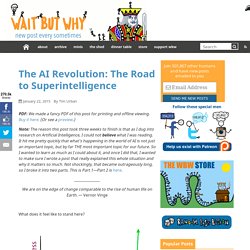
Buy it here. (Or see a preview.) Note: The reason this post took three weeks to finish is that as I dug into research on Artificial Intelligence, I could not believe what I was reading. Intelligent Machines: The jobs robots will steal first. Image copyright Thinkstock If you are sitting at a desk, driving a taxi or carrying a hod, stop for a moment and ask: could a robot or machine do this job better? The answer, unfortunately for you, is probably - yes.
Burger Robot Poised to Disrupt Fast Food Industry. I saw the future of work in a San Francisco garage two years ago. Or rather, I was in proximity to the future of work, but happened to be looking the other direction. At the time, I was visiting a space startup building satellites behind a carport. But just behind them—a robot was cooking up burgers. The inventors of the burger device? Momentum Machines, and they’re serious about fast food productivity. Will a robot take your job? Type your job title into the search box below to find out the likelihood that it could be automated within the next two decades. About 35% of current jobs in the UK are at high risk of computerisation over the following 20 years, according to a study by researchers at Oxford University and Deloitte.
Tap here for the interactive. Sources. Erik Brynjolfsson and Andrew McAfee. The debate over what technology does to work, jobs, and wages is as old as the industrial era itself. In the second decade of the nineteenth century, a group of English textile workers called the Luddites protested the introduction of spinning frames and power looms, machines of the nascent Industrial Revolution that threatened to leave them without jobs. Since then, each new burst of technological progress has brought with it another wave of concern about a possible mass displacement of labor. On one side of the debate are those who believe that new technologies are likely to replace workers. Rise of the Robotic Workforce. The press has recently been awash in stories of worker robots of ever-increasing ability making human labor obsolete.
Is it true that we are approaching a future of a mechanized workforce where humans need not apply? Experts’ opinions on the future of technological development vary spectacularly, as do views on the nature and magnitude of robotics’ impact on society and mankind’s ability to adapt. But one thing is collectively agreed upon: robotics has begun and will continue to transform the workforce in profound and inevitable ways. Fears that automation will lead to unemployment have existed for centuries, but humans have shown a remarkable ability to adapt to modernization of work. While the percentage of Americans that plowed the fields dwindled from 33 percent to two percent over the last century, for instance, countless unforeseen occupations materialized.
Robots and empathy. A robot exploring the world. Toyota Announces Major Push Into AI and Robotics, Wants Cars That Never Crash. At a press conference in Palo Alto, Calif., today, Toyota is announcing the first step of what is expected to be a major push into artificial intelligence and robotics, technologies that the company sees as critical for addressing current and future societal challenges. Toyota, the world’s largest automaker by sales, says it will establish two collaborative research centers at MIT and Stanford, with an investment of $50 million over the next five years. The initial focus will be on accelerating the development of AI with applications to smarter and safer vehicles, as well as robots that can make our lives better at home, especially as we age. Toyota says an immediate goal is to figure out ways to save lives on the road. Why haven’t Robots taken our Jobs? The Complementarity Effect. You’ve probably noticed the trend.
How To Plan Now For Tomorrow's Robotic Workforce. Error Page. † Introductory offers to be billed 4 weekly as per the following - Digital Membership $3/wk, $12 billed 4 weekly; Digital Membership + WEEKEND Delivery $3/wk, $12 billed 4 weekly; Digital Membership + 7 DAY Delivery $6/wk, $24 billed 4 weekly. At the end of the initial 12 weeks, subscriptions will automatically renew to the higher price to be billed 4 weekly as per the following - Digital Membership $6/wk, $24 billed 4 weekly; Digital Membership + WEEKEND Delivery $6/wk, $24 billed 4 weekly; Digital Membership + 7 DAY Delivery $12/wk, $48 billed 4 weekly. Technological Unemployment: The Past, Future and Possible Solutions.
Technological unemployment is the notion that even as innovation creates new opportunities, it destroys old jobs. Automobiles, for example, created entirely new industries (and convenience), but eliminated jobs like train engineers and buggy builders. High Skill Jobs Aren't Safe from Technology, with Andrew McAfee.
The Jobs Robots May Eliminate, Create, Transform. Robotics and other technologies have eliminated many jobs across the global economy, but as these technologies continue to advance, they have the potential to create more engaging jobs for workers. Robotics and artificial intelligence (AI) have been in development for decades and, for most of that time, futurists have been predicting the jobs these technologies would eliminate.
Will Your Job Be Done By A Machine? : Planet Money. 60% of students are chasing jobs that may be rendered obsolete by technology, report finds - News - Gadgets and Tech - The Independent. More than half of students are chasing careers that will be made obsolete by advances in technology and automation, according to a report by the Foundation for Young Australians (FYA). What Jobs Will the Robots Take? It is an invisible force that goes by many names. Computerization. Better skills will not save middle-class jobs from automation / Articles - The Broker. Job Polarization Leaves Middle-Skilled Workers Out in the Cold. The Rich and Their Robots Are About to Make Half the World's Jobs Disappear.
Automation, jobs, and the future of work. Future of Work - Future Proofing Our Careers - Labor Science Network. Post-Capitalism: Rise of the Collaborative Commons — Basic income. Dp1330.pdf. Episode 3 of Ask an Expert Now Online: Will Robots Take Our Jobs? [Video] The One Where Larry Summers Demolished the Robots and Skills Arguments. Are we heading towards a jobless future? 26792~Futureworkforce_June2015. Australia's future workforce? Jobs, Productivity and the Great Decoupling. The Great Decoupling: An Interview with Erik Brynjolfsson and Andrew McAfee. Ir.citi. How our coming ‘robot dystopia’ is changing the future of work. Judging by their discussion paper, Labour's future of work involves a lot of cutting and pasting — Phil Quin.
LSN_Discussion_Paper_-_Future_of_Work_in_the_New_Machine_-_Future_Proofing_Our_Careers_v.2.pdf. Technology, globalisation and the future of work in Europe: Essays on employment in a digitised economy. Technology-globalisation-future-of-work_Mar2015.pdf. A World Without Work. Technology, globalisation and the future of work in Europe: Essays on employment in a digitised economy. Pp102.pdf. Debunking the Debunking of "Humans Need Not Apply" and More.
Technology has created more jobs than it has destroyed, says 140 years of data. Help wanted: The future of work in advanced economies. The Future of Work in the Age of the Machine. Business feature: Scarce Skills, Not Scarce Jobs - Business - Pulse. The Future of Work – Impacts and Implications - Future Agenda. Q&A: The Future of Work - Video Archive - The Conference by Media Evolution. Thompson on the future of work. The Australian news. Business and Finance News. The New American Dream? Let the Robots Take Our Jobs. Jep.29.3. Fya-future-of-work-report-final-lr. Everything You Think You Know About The History and Future of Jobs Is Likely Wrong. Fya-future-of-work-report-final-lr. The_Future_of_Employment.pdf. Will the Rise of The Robots Implode the World Economy? Canadian companies not prepared for new technology, Deloitte survey says. Ca-en-insights-issues-future-of-productivity-2015.pdf. Prepare for Canada's disruption storm.
Deloitte-uk-finance-robots-are-coming.pdf. Journal of Evolution and Technology. Job automation: speed of innovation could send economies towards stagnation. Rise of the Robots and the future job market - Martin Ford interview. Trends in Newsrooms: The rise of robots. The_Future_of_Employment.pdf. World of Labor - Who owns the robots rules the world. Dp1335.pdf. Dp1335.pdf. ‘Rise of the Robots: Technology and the Threat of a Jobless Future’, by Martin Ford. 'Second Machine Age' author says machines are taking over humans - Home. Rise of the Robots and the future job market - Martin Ford interview. Second Machine Age. Explicit cookie consent. Why You Can't Pump Your Own Gas in New Jersey.
Boredom room. How Technology Is Destroying Jobs. 20 Crucial Terms Every 21st Century Futurist Should Know. Technology, Unemployment & Policy Options: Navigating the Transition to a Better World. Robotic Freedom, by Marshall Brain. What does a world without full-time jobs look like? - Aug. 22, 2015. Part I: The demand for offshore talent in services. Technological Unemployment and Personal Well-being: Does Work Make Us Happy? 5 Major Ways Freelancers Will Change The Economy By 2040. Ir.citi. Our Series on the Decline of Work: An Introduction.